Submission
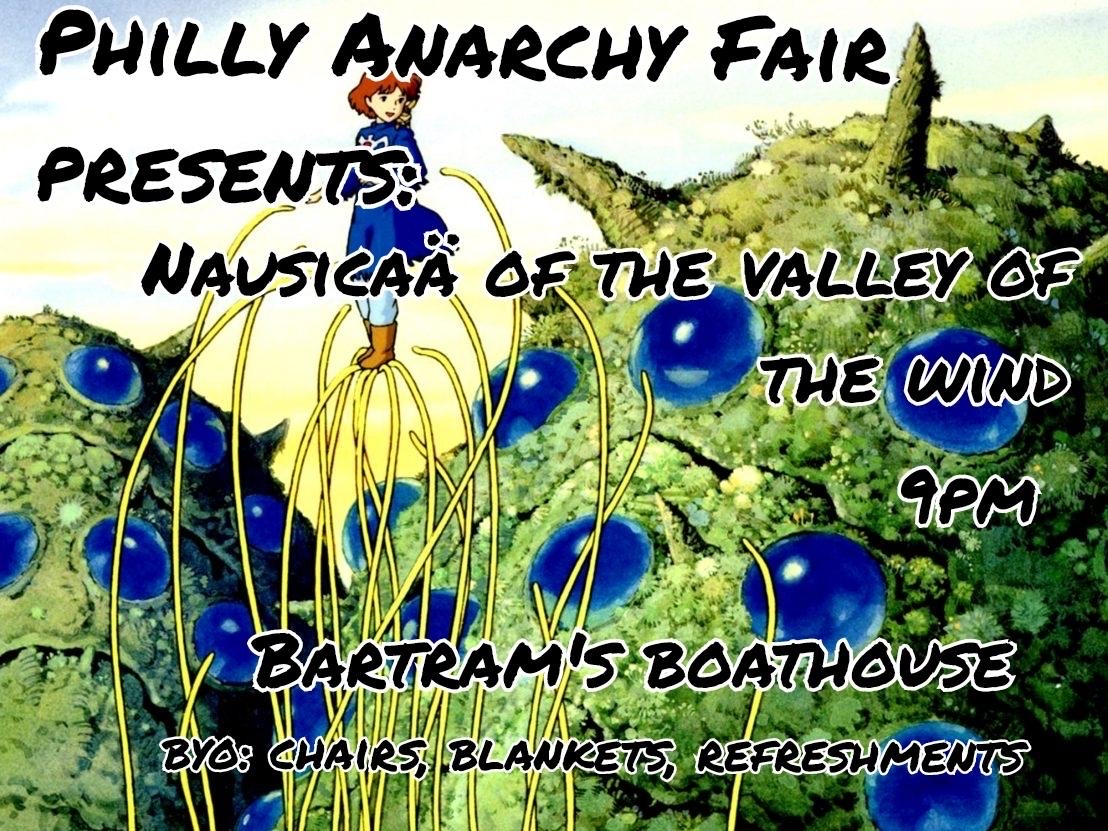
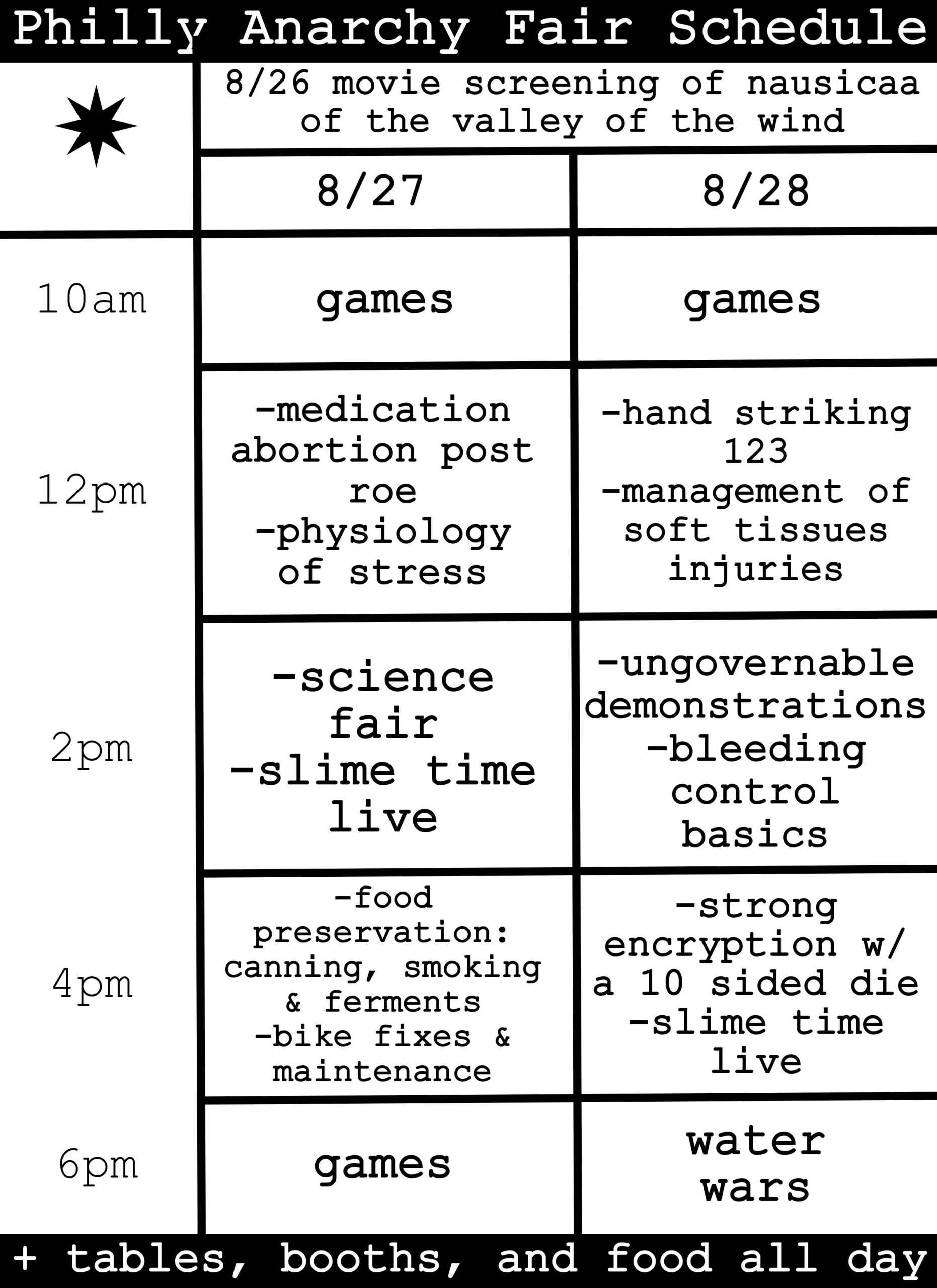
Submission


from Anathema
Volume 8 Issue 1 (PDF for reading 8.5×11)
Volume 8 Issue 1 (PDF for printing (11×17)
In this issue:
from Instagram

from Mainstream Media
A federal judge on Thursday questioned prosecutors’ push to imprison a trans activist who was arrested after a New Year’s Eve 2020 protest outside the Federal Detention Center in Center City.
Philadelphia police officers found Josie Robotin, 26, of Willow Grove, carrying a backpack filled with what they described as a Molotov cocktail, several firecrackers, lighters, and a container filled with flammable liquid near the demonstration, which had been organized to protest for the rights of trans prisoners.
She was federally charged with possession of an unregistered destructive device and later pleaded guilty to that crime.
But at her sentencing hearing Thursday, U.S. District Judge John R. Padova credited her story that she brought the incendiaries not to use at the protest but rather for a bonfire she and her friends planned to attend later that night to celebrate the New Year’s holiday.
He sentenced her to a day in prison — or time served — far less than the two years prosecutors were seeking.
“Isn’t it fair to say we have a defendant who was engaged at the time in a fair exercise of freedom of speech?” the judge asked Assistant U.S. Attorney Vineet Gauri before announcing his decision. He wondered aloud whether Robotin and her crime were “the time, the place, the person to make an example of.”
Robotin’s sentence is only the latest in a string of cases arising from the 2020 protest movement in Philadelphia in which federal judges have imposed sentences far less punitive than those sought by the government.
Last month, Lore-Elisabeth Blumenthal, a Philadelphia-area massage therapist, was sentenced to 2½ years in prison for setting police cars ablaze during protests over the police killing of George Floyd. The government had asked for four.
That same month, another defendant charged with torching police cars during the demonstration — Ayoub Tabri, 25, of Arlington, Va. — received a prison sentence of 364 days. Prosecutors had pushed for three to four years.
But Padova was the first judge in those cases to explicitly question whether the Justice Department’s stance was overly harsh toward the defendant exercising their right to protest.
He noted prosecutors had presented no evidence that Robotin had planned to commit any crime with the incendiary device in her backpack.
Gauri, the prosecutor, stressed that Robotin had pleaded guilty and stressed that the Molotov cocktail she was carrying could very well have proved more dangerous than a gun.
“This is a destructive device,” he said. “It’s designed to inflict serious injury and casualties. It’s not designed for bonfires and parties.”
But ultimately, Gauri offered little pushback, acknowledging that the Justice Department had taken a “holistic view” of protest cases around the country when deciding on sentencing recommendations for the Philadelphia defendants.
In all, former U.S. Attorney Bill McSwain charged six people with federal arson charges tied to the 2020 demonstrations, vowing to pursue the mandatory minimum sentence of at least seven years in each case — part of a wider Trump-era Justice Department strategy to crack down on property destruction tied to the protests.
But since Trump and McSwain left office, prosecutors have extended deals to many of the defendants, offering to drop the arson count if they pleaded guilty to a lesser charge of obstructing law enforcement during a civil disorder. That crime is punishable by up to five years.
In Robotin’s case, she hadn’t been charged with arson or accused of starting a fire, her attorney Marni Jo Snyder noted Thursday.
“My client was participating in the exercise of freedom of speech in the right way,” she said, adding later: “No one at that protest at the FDC tried to set anything on fire.”
Still, Robotin was arrested on Dec. 31, 2020, along with six others as part of what Philadelphia police described at the time as a “large group of 40 to 50 unruly antifa protesters” who broke windows and spray-painted buildings on the streets around the detention center.
The crowd set off fireworks, painted buildings with slogans such as “ACAB” — an abbreviation for All Cops Are Bastards — and smashed a Philadelphia Sheriff’s Office vehicle parked nearby.
But police investigators later walked back their claim that those charged had direct ties to antifa — a loose network of far-left groups often accused of an array of antigovernment misdeeds — saying instead that the vandalism and destruction that night appeared antifa-inspired.
Addressing the judge Thursday, Snyder sought to separate Robotin from the vandals. Aside from the unused incendiary device Robotin was carrying, the lawyer noted, prosecutors had presented no evidence that she had been involved in any of the other crimes that occurred after the protest.
Robotin, meanwhile, said the events of 2020 — from the pandemic to Floyd’s death, to a rise in bias-related crimes — had served as a “powder keg” that prompted her presence at the protest outside the FDC that night.
Still, she told the judge, she was not trying to minimize the crime to which she had pleaded guilty.
“My intention was to hand out firecrackers to partygoers [at the planned bonfire later that night] and to use what was described in the report as an incendiary device to light logs that would not light on fire on their own,” she said. “In hindsight, I can see how alarming that would be [for officers] to find.”
When it came time to impose his time-served sentence, Padova said he’d been persuaded that Robotin had learned her lesson and that he was impressed by her record of activism and volunteering in the trans community.
He responded: “I know that you don’t believe you’re being blessed for that criminal conduct. You have pleaded guilty to a very serious crime. Fortunately, no one was hurt.”
Of the seven protesters arrested that night, only Robotin was charged with a federal crime. The others faced state charges. Their cases have all since been dismissed, withdrawn, or resolved in plea deals resulting in only a court-imposed fine.
from We Love Lore
A message from Lore:
It’s Lore here! I am out of prison and safely in the arms of family! Thank you all for your two+ years of urgent work and generous donations that all built up to my liberation! These efforts sustained myself and my peers in FDC. You filled my heart, my hands, and kept my mind free.
I look forward to bringing you all in for continued support of the disproportionately affected Black, Indigenous, and Latinx people and parents incarcerated right now. If you can, please continue donating to my commissary drive, and keep your attention and action focused here for upcoming ways you can support those on the inside. Your sweet support in the future will swell my big dreams for those who remain stolen. Thank you all for being a light for punished people who need love, healing, accountability and liberation most of all.
Please stay in touch with me here and on email (freelore [at] protonmail [dot] com), if you have ever written to me please send me your address again, I’m excited to stay in touch!
We’ve got this!

from Viscera
Join us Sunday, August 14th from 1-3 for our next reading discussion. We’ll be talking about “Anarchy & Strategy,” an essay by Aragorn! originally published in Anarchy: A Journal of Desire Armed (AJODA).
An anarchist strategy is not a strategy about how to make a capitalist or statist society less authoritarian or spectacular. It assumes that we cannot have an anarchist society while the state or capitalism continues to reign.
You can find the reading here.
As usual, this discussion will be held outdoors at Clark Park – we’ll be meeting, as usual, near the chess tables (look for the disreputable-looking people mostly dressed in black who aren’t playing bocce).
from Making Worlds Books
Making Worlds Book Reading and Discussion: Everything for Everyone: An Oral History of the New York Commune, 2052–2072 [Philadelphia launch]
By the middle of the twenty-first century, war, famine, economic collapse, and climate catastrophe had toppled the world’s governments. In the 2050s, the insurrections reached the nerve center of global capitalism—New York City. This book, a collection of interviews with the people who made the revolution, was published to mark the twentieth anniversary of the New York Commune, a radically new social order forged in the ashes of capitalist collapse.
Here is the insurrection in the words of the people who made it, a cast as diverse as the city itself. Nurses, sex workers, antifascist militants, and survivors of all stripes recall the collapse of life as they knew it and the emergence of a collective alternative. Their stories, delivered in deeply human fashion, together outline how ordinary people’s efforts to survive in the face of crisis contain the seeds of a new world.
Registration required, click here.
About the Author
M. E. O’Brien writes and speaks on gender freedom and capitalism. She coedits two magazines, Pinko, on gay communism, and Parapraxis, on psychoanalytic theory and politics. Her work on family abolition has been translated into Chinese, German, Greek, French, Spanish, and Turkish. Previously, she coordinated the New York City Trans Oral History Project, and worked in HIV and AIDS activism and services. She completed a PhD at NYU, where she wrote on how capitalism shaped New York City LGBTQ social movements. You can support her writing through patreon.com/meobrien, and find her on twitter @genderhorizon. Everything for Everyone: An Oral History of the New York Commune, 2052–2072 is her first book.
[Saturday, August 13, 2022 6:00 PM 7:30 PM (map)]
from mainstream media
“The encampment is trespassing on private property,” the judge said.
/cloudfront-us-east-1.images.arcpublishing.com/pmn/YYK2AWG4T5E5DPVC2COQ73Z524.jpg)
A judge has ordered that the protest encampment at University City Townhomes in West Philadelphia be cleared out by 9 a.m. Monday.
“The encampment is trespassing on private property and I have ordered it to be dismantled” by the Philadelphia Sheriff’s Office, Common Pleas Court Judge Joshua Roberts said during a hearing held via Zoom on Thursday afternoon.
The encampment, a mix of tenants and supporters, was formed with around 15 tents and a border of wooden pallets on the sidewalk nearly a month ago in response to the efforts by IBID Associates, owners of the townhomes, to sell the property for redevelopment.
Calling the judge’s ruling “absurd b.s.,” townhomes resident Krystal Young, 28, said Thursday night that people of the encampment have decided they will resist any attempt to break it up.
“We are gonna stand up and defend ourselves,” she said, without elaborating.
Darlene Foreman, 60, a member of the People’s Townhomes Residents Council, an encampment leadership group, concurred with Young.
“We are gonna do what we need to do, the best way we can,” she said. Asked to explain, Foreman said: “I can’t give you all the secrets.”
The 2.7-acre affordable-housing complex sits at 40th and Market Streets. As many as 69 primarily Black and Hispanic families are set to be displaced.
On July 22, Roberts issued the original order saying the encampment would have to be disbanded.
News of the Monday clear-out didn’t surprise people at the encampment, who had expected this outcome.
That didn’t make the judge’s order any easier to accept.
“This process is turning us upside down,” said Foreman, one of two townhomes residents who spoke during the court proceeding. “We feel disrespected. We could wind up living in some of the tents.”
A statement from IBID last month called the encampment “an unfortunate and ill-advised decision.” Those who gathered there had “no legal right to assemble,” it said.
In an unusual back-and-forth during the hearing between Roberts and attorney Daniel McElhatton, who represents IBID, McElhatton referenced the clear-out, and strongly suggested to the judge that anyone refusing the order to vacate should be “taken into custody.”
“I’m not going to do that,” Roberts responded.
“How about putting them on a bus and sending them to Baltimore?” McElhatton said.
Roberts didn’t respond directly to the remark. But he said: “Everyone is going to be asked to leave. No one will be detained.”
McElhatton didn’t respond to requests for comment.
IBID has owned and operated the townhomes for 40 years.
In 1982, the federal government agreed to make housing-assistance payments to IBID in exchange for IBID’s development and leasing of dwelling units on the property at subsidized rents, according to court records.
Once the 20-year term expired in July, IBID had a choice to renew its contract with HUD or opt out of the housing-assistance program.
In statements and conversations, people participating in the protest encampment have said that they wish to remain in the fast-gentrifying neighborhood, and that they’d be uncomfortable if compelled to relocate to areas outside West Philadelphia.
Tenants will be given housing vouchers, but they fear landlords won’t take the vouchers and they won’t be able to find affordable housing because of an ongoing shortage.
The townhomes are in the Black Bottom neighborhood, a historically Black neighborhood.
The property has long been zoned for commercial mixed use, which allows for high-density commercial office, research and development, and residential uses, court records show.
“Unfortunately, the owners are entitled to sell the property or do with it as they wish,” said Dennis Culhane, professor of social policy at the University of Pennsylvania and a national expert on homelessness.
“However, it’ll mean a net decline in low-income units.”
The program that the federal government used to offer favorable terms to IBID in exchange for making affordable housing available doesn’t exist in the same form that it did decades ago, Culhane said.
Because the government no longer makes these deals, there isn’t a pipeline of low-cost housing for people who need it.
“We have an affordable-housing shortage in this city,” Culhane noted.
from Twitter
Johnny is on Day 3 of fasting for #BlackAugust. Last time he went on an official hunger strike to protest retaliation in Delaware, they wrote him up for every meal he missed, for causing a “health, safety and fire hazard” and “failing to obey an order.”
Johnny is an anti-racist prison rebel who was indicted for alleged participation in the 2017 uprising at the same facility he is currently housed in. For more information about the #Vaughn17, see vaughn17.com and itsgoingdown.org/united-we-s…
from Jersey Counter-Info
Anonymous Submission to Jersey Counter-Info
This past Saturday, July 30, 2022, Bordentown NJ held the city’s first ever community queer pride, which had been rescheduled from June due to inclement weather. The event had been publicly advertised for well over a month and the event plans broadcasted over varying news sites and social media.
Somewhat unexpectedly, five fascists, including Dan D’ambly and Ron Sheehy, from New Jersey European Heritage Association (NJEHA) showed up at Bordentown to disrupt the event and harrass queer community members. While it should be expected at this point for queerphobes of all types to be present at pride/queer events regardless of whether their presence is advertised or not, this shows an overall shift in fascist tactics throughout the state. As covered previously by Jersey Counter-Info, fascists and transphobes as of late have been publicly harassing public forums and event organizers/participants before events. After the said online harassment occurs the transphobes and fascists then turn up at events to continue their assault in person.
The deviation from this prior pattern tells us a few things, but primarily that certain fascist groups are becoming more security minded and using varied protest tactics to their benefit. Excluding NJEHA, all other fascist or transphobic groups in the region such as informal groups led by Terry Beck and White Lives Matter NJ, have been organizing very publicly against the queer community and organizations. There is likely a variety of reasons as to why they use this tactic, whether they are trying to build their organization bases or strike fear into the queer community in advance of an event. Regardless of their reasoning however, their pattern of behavior has enabled the anti-fascists to be able to respond swiftly and shut down the majority of their events, keeping the public safe and taking fascists head on in the streets. Similarly, NJEHA used these kinds of tactics in the past and were also largely unsuccessful. NJEHA’s shift in tactics shows they are becoming aware of operational security concerns and are learning from their past experience. Keeping their plans closed and amongst themselves they were able to avoid having masses of people counter-protesting against them, eliminate the added pressure of public commentary on social media, and have no interruptions in their planning phase.
With NJEHA’s presence at Bordentown pride not advertised, the antifascist response was unorganized. While there were some counter protestors to confront NJEHA the overall response was nowhere near what it should have been. NJEHA members were heckled and addressed by those there but were not disrupted to the point where they were forced to leave or thrown out by the public’s response. They were largely able to do what they came to do and which is a failure of anti-fascists in New Jersey. NJEHA felt enough safety in their actions on July 30, 2022 that they posted propaganda pictures after Bordentown pride on their public telegram account garnering thousands of views. With all of this added together, NJEHA’s actions on July 30, 2022 can be considered a failure of anti-fascists in the region.
Antifascists in this region should adapt to these new tactics and be better prepared for future events where fascists like NJEHA show up.
To NJEHA and other fascists and bigots reading this: Do not mistake this pause as proof of your safety. We are watching.
– some antifascists
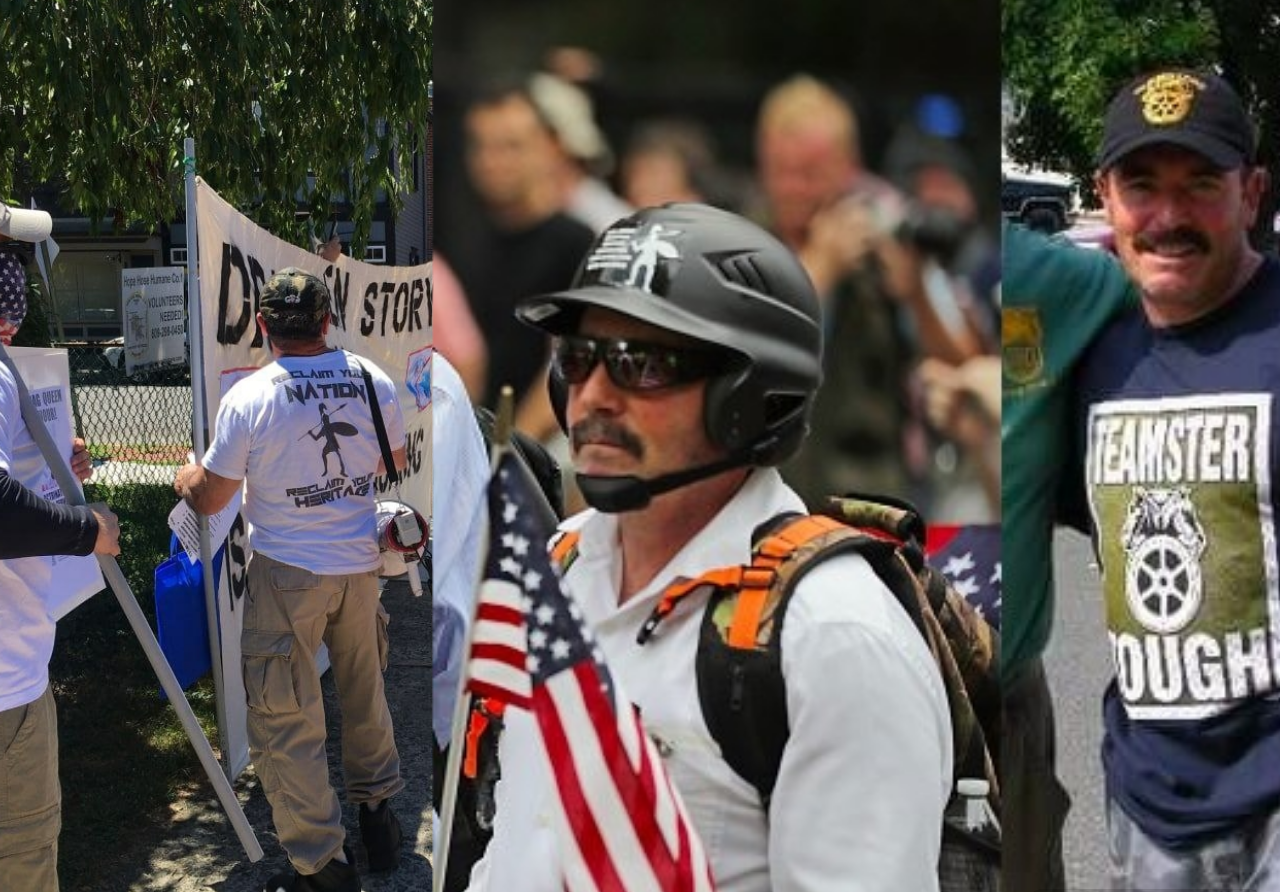
Dan D’ambly is 64 years old and lives at 1102 Blossom Circle in apartment 305 in Dayton NJ. He has two vehicles, a dark colored older model Toyota and a gold colored Cadillac.
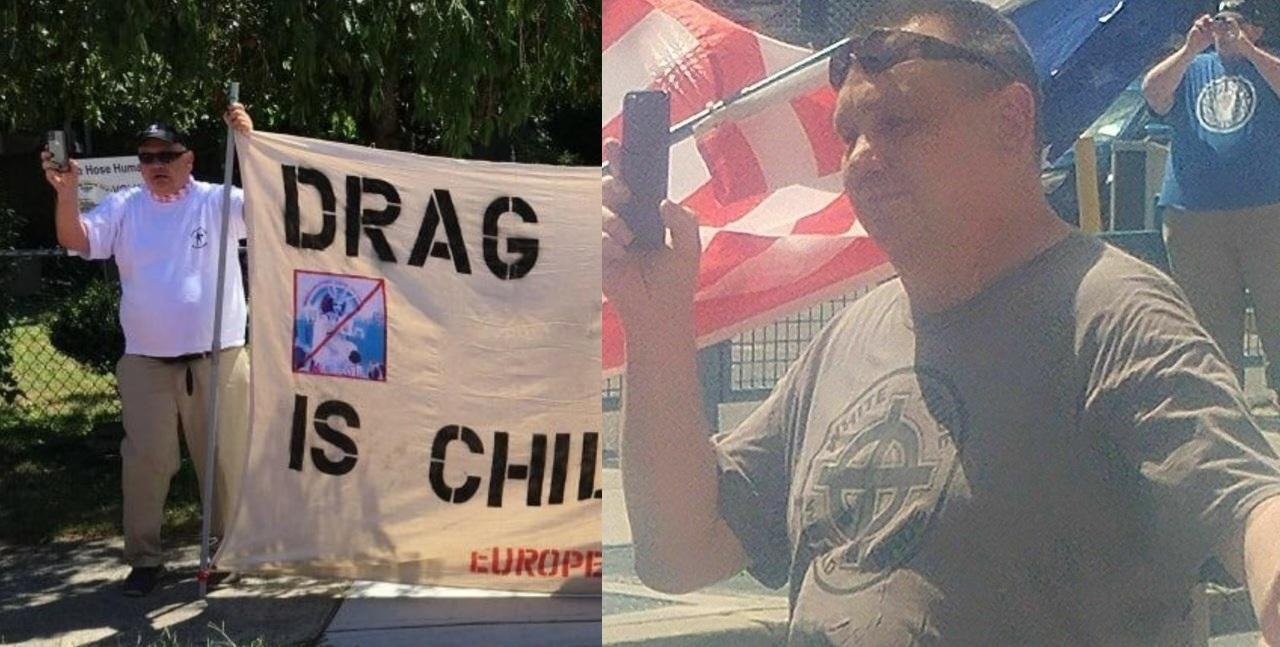
Ron Sheehy is 55 years old and lives at 207 6th Street in Barnegat NJ. He has a 2012 Jeep
from It’s Going Down
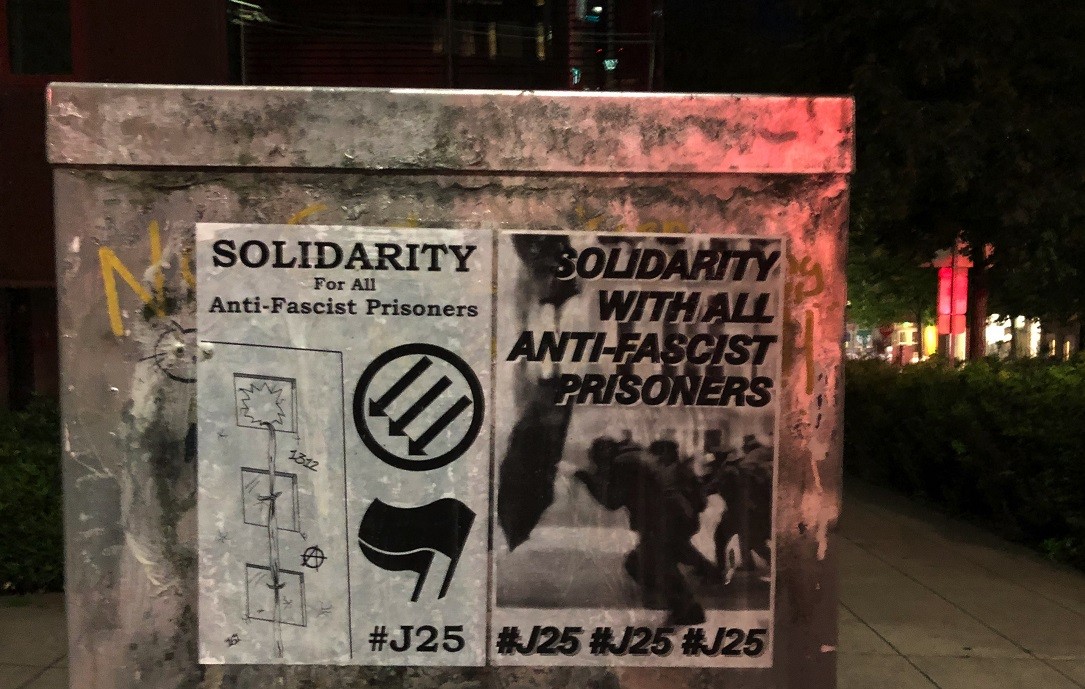
[This post only contains information relevant to Philadelphia and the surrounding area, to read the entire article follow the above link.]
The Green and Red podcast recently published a new interview with someone working on the Uprising Support site. Philadelphia uprising defendant Lore Elisabeth Blumenthal has now been sentenced to 30 months in prison, which means she will be due for release shortly, having already served 25 months waiting for her trial.
Fayette Speaks is a new podcast that aims to amplify the voices of prisoners at SCI Fayette in Pennsylvania, with the first episode coming soon.
Everyone should support the defendants facing charges related to their alleged participation in the George Floyd uprising – this list of our imprisoned comrades needs to be getting shorter, not longer. See Uprising Support for more info, and check out the Antirepression PDX site for updates from Portland cases. The status of pre-trial defendants changes frequently, but to the best of our knowledge they currently include:
David Elmakayes 77782-066
FCI McKean
Federal Correctional Institution
P.O. Box 8000
Bradford, PA 16701
Lore-Elisabeth Blumenthal 70002-066
FDC Philadelphia
PO BOX 562
Philadelphia, PA 19105
Lawrence Michaels
A former Vaughn 17 defendant, and contributor to the Vaughn zines, “Live from the Trenches” and “United We Stood”. While the state has now dropped its attempts to criminalize Lawrence in relation to the uprising, he, like all of the Vaughn 17, deserves respect and support for making it through the entire process while staying in solidarity with his co-defendants and refusing to co-operate with the prosecution.
Pennsylvania uses Connect Network/GTL, so you can contact him online by going to connectnetwork.com, selecting “Add a facility,” choosing “State: Pennsylvania, Facility: Pennsylvania Department of Corrections”, going into the “messaging” service, and then adding him as a contact by searching his name or “NW2894.”
Birthday: August 14
Address:
Smart Communications / PA DOC
Lawrence Michaels – NW2894
SCI Frackville
P.O. Box 33028
St. Petersburg, FL 33733
Pedro Chairez
A former Vaughn 17 defendant. While the state has now dropped its attempts to criminalize Pedro in relation to the uprising, he, like all of the Vaughn 17, deserves respect and support for making it through the entire process while staying in solidarity with his co-defendants and refusing to co-operate with the prosecution. You can read some of Pedro’s words here.
Illinois uses Jpay, so you can send him a message by going to jpay.com, clicking “inmate search”, then selecting “State: Illinois, Inmate ID: Y35814”.
Birthday: August 17
Address:
Pedro Chairez Y35814
Pontiac C.C.
P.O. Box 99
Pontiac, IL 61764
Submission
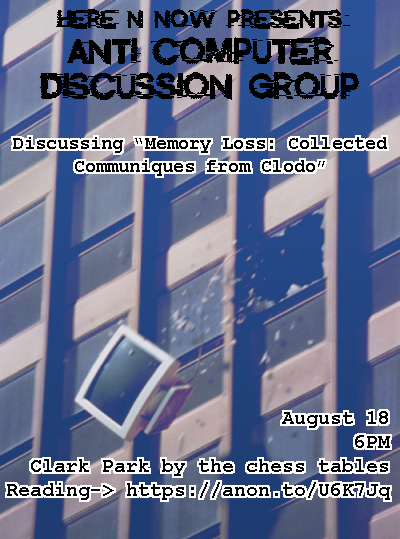
Here & Now presents:
Anti-Computer Discussion Group
August 18th
6pm
Clark Park by the chess tables
This is a discussion group, come having read the material if possible.
“Our society of “IF… GO TO”, codified, aligned, controlled, this society where we connect like trains in a rail yard, desperately hoping to reduce chance and cancel the revolt, where those in power consider themselves the indispensable designer or analyst, where the binary and the quantitative are supposed to solve the crisis, this society in which we live is unbearable and inhuman.”
Memory Loss: Collected Communiques from CLODO
https://anon.to/U6K7Jq
Submission
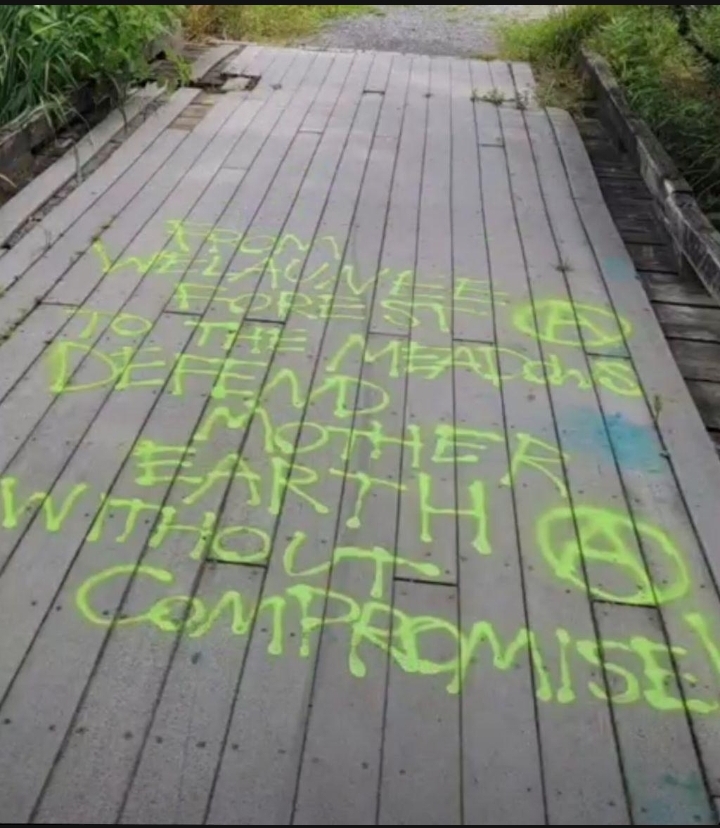
Graffiti in Solidarity with Welaunee Forest Defenders from the Meadows of Lenapehoking ( South Philly ) for the Week of Action that reads “From Welaunee Forest to the Meadows Defend Mother Earth Without Compromise!”
As our Friends and Comrades are fighting against the “Cop City” that is proposed to destroy the Welaunee Forest in Atlanta, We are connected in struggle here in the Lenni-Lenape meadows of so called “FDR” Park in South Philly. Over 100+ Acres of Meadows that that has rewilded is under threat of development by “astro-turf” sports fields and yuppie tourist shops. A large coalition of over 20+ groups and many autonomous people are resisting and will fight to defend the Meadows without compromise. The whole planet is under attack by colonial capitalist developers and the state and we are on the verge of runaway climate change! We need a global eco-revolution for our collective survival before it’s too late! So Destroy capitalism and the state! WHEREVER YOU ARE REVOLT FOR MOTHER EARTH!
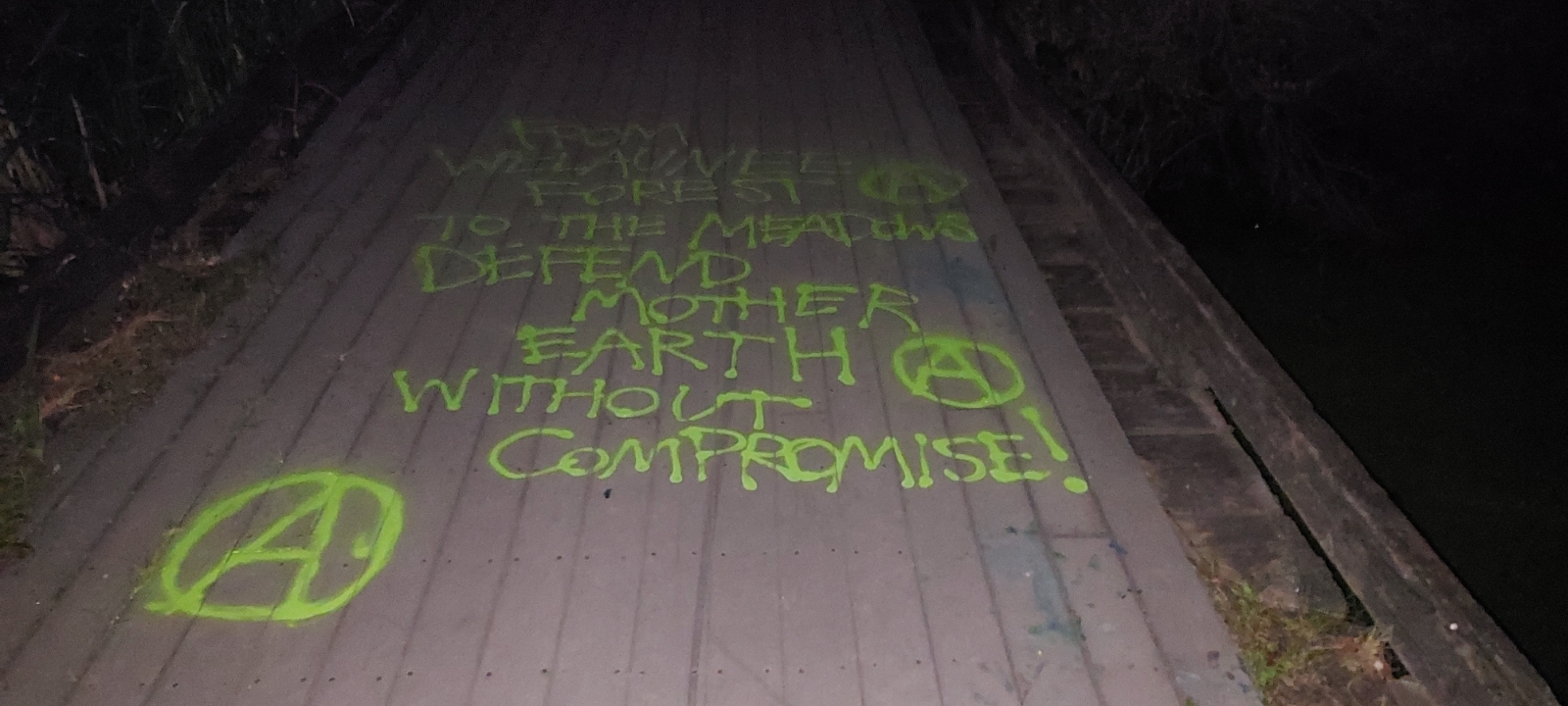
from We Love Lore
Hello fellow Lore supporters and friends! We are thrilled to announce that Lore will be home no later than the end of this year. Thank you all for contributing in so many different and meaningful ways to make this happen. This could not have happened without each and every one of you holding Lore in the light for more than two years of darkness and uncertainty. The work to make Lore, her family, and her community whole again will continue, but this is a time to look forward to that work with gratitude and hope.
On Thursday, July 28, Senior Judge R. Barclay Surrick of the Eastern District of Pennsylvania sentenced Lore to serve 30 months in prison, followed by two years of supervised release (aka – probation), and to pay restitution for two counts of civil disorder (18 U.S. Code § 23). Because Lore has already served over 25 months at FDC Philadelphia, and with credit for good behavior that she has earned during that time, this ruling means that Lore could be released from detention as early as this fall 2022. We will let you know when we have a firm date for that release. It will be a time for great celebration with Lore, her family, and community.
Judge Surrick’s sentence falls far below the four years sought by government prosecutors and even below the minimum time suggested by federal guidelines for Lore’s charges. His decision was informed by 50 letters of support from Lore’s community, witness testimony to Lore’s life and character, an impassioned defense by her attorneys, and ultimately by a stirring allocution statement by Lore that brought many of her 40 supporters attending in the gallery to tears.
Earlier this year, Lore entered into a plea agreement with the government that would reduce her charges significantly, from arson charges that carried mandatory minimum sentences of seven years each. In a 2021 report, the Movement for Black Lives (M4BL) and the Creating Law Enforcement Accountability & Responsibility (CLEAR) project at the City University of New York called Lore’s charges a shocking example of prosecutorial overreach to disrupt and suppress the movement against police violence. We will continue to work in solidarity with others facing charges and repression from the summer of 2020.
We are profoundly grateful to Lore’s attorneys Paul J. Hetznecker and Marni Jo Snyder, to the 700+ donors who raised funds for Lore’s defense and well being, and to the countless people who wrote letters of solidarity and support to sustain Lore during this excruciating ordeal.
While we are taking this as a win and allowing ourselves to breathe and celebrate, support needs are not over. Lore and her family and community will need support to raise funds for the restitution she is required to pay which exceeds $96,000. We will be sending updates and starting a fundraising blast for that in the near future. Additionally, please continue to share and donate to Lore’s commissary fund via PayPal, Venmo, and Cashapp, send letters and photos, and support our peers in ending the persecution of activists and community builders. In her statement to the judge, Lore observed that prisoners like her were all capable of tremendous growth if just given a little support. She gets that support from you. Inside the FDC, she has quickly become an advocate for other incarcerated women and we look forward to her leadership in their support for years to come.